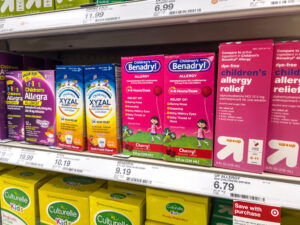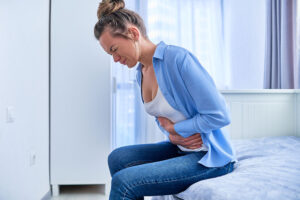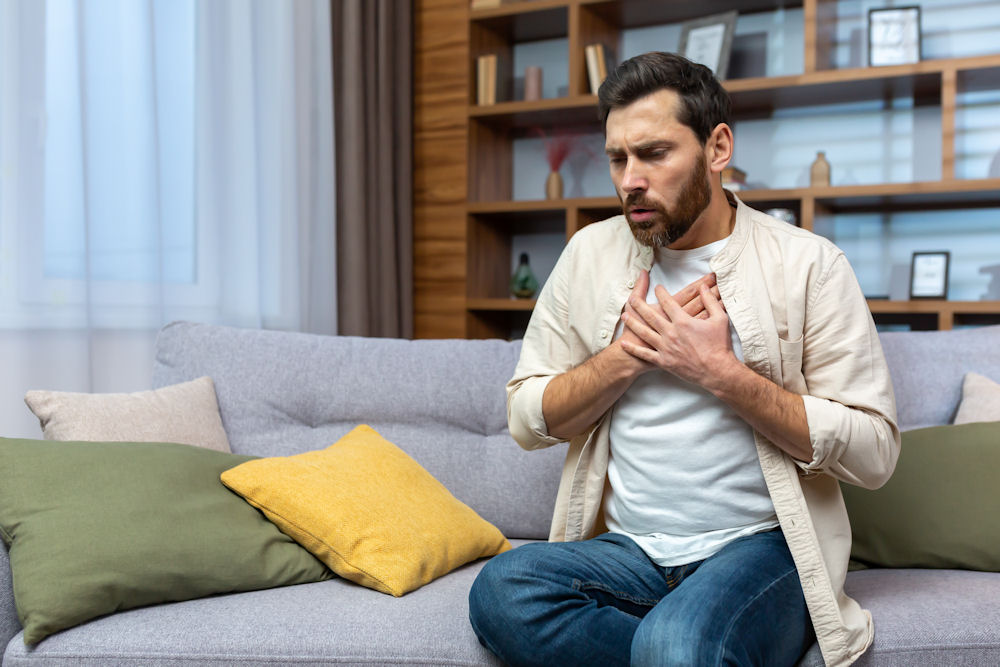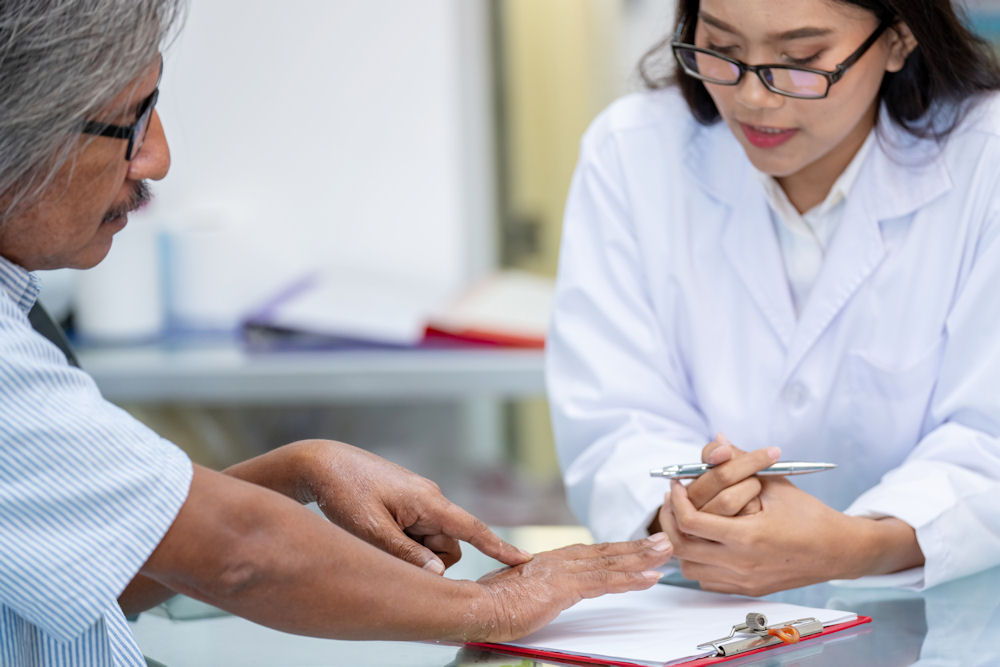Allergy season is among us, and with that comes the mad dash to the pharmacy or grocery store for allergy medication, either prescription or over-the-counter. One over-the-counter allergy medication that is particularly popular is Benadryl. Whether it’s the springtime bloom, a high pollen count, or anything else that may cause your allergies to get the better of you, antihistamines such as Benadryl can often provide relief.
While Benadryl is popular, especially this time of year, as a medication, it doesn’t come without potential risks and side effects. One of those potential risks is what can happen when it is mixed with alcohol.
So, with allergy season here and Benadryl being one of the more popular allergy medications on the market, we thought it would be a good time to take a look at what happens when Benadryl and alcohol are mixed, the risks associated with it, and why doing so can ultimately lead to the development of an addiction.
What is Benadryl?
 As we mentioned, Benadryl is a popular allergy medication that is sold over the counter in drugstores, pharmacies, and grocery stores nationwide. It is an antihistamine commonly used to treat symptoms of allergies such as a runny nose, sneezing, itching, and watery eyes. It can also be used to treat symptoms of the common cold, such as cough and congestion, as well as symptoms of hay fever and insect stings.
As we mentioned, Benadryl is a popular allergy medication that is sold over the counter in drugstores, pharmacies, and grocery stores nationwide. It is an antihistamine commonly used to treat symptoms of allergies such as a runny nose, sneezing, itching, and watery eyes. It can also be used to treat symptoms of the common cold, such as cough and congestion, as well as symptoms of hay fever and insect stings.
Benadryl works by blocking the effects of histamines, which are chemicals produced by the immune system in response to allergens and are what is ultimately responsible for many allergy symptoms. As an antihistamine, Benadryl prevents histamines from binding to certain receptors in the body, helping to reduce allergic reactions and symptoms. While Benadryl is often found in tablet form, it is also made in the form of capsules, liquid, and topical creams.
What Happens When You Take Benadryl?
The primary goal of taking Benadryl is to alleviate or relieve any allergy-related symptoms you may be experiencing. Once you take Benadryl and the drug enters the bloodstream, it blocks the histamines from causing any allergic reaction that would bring on those allergy-related symptoms, such as sneezing, itchy eyes, or a runny nose.
While Benadryl helps in relieving many of these symptoms, it also comes with side effects, some of which can be quite noticeable and have an impact on your ability to go about your day. One of the most prominent side effects is drowsiness. While this may be beneficial when taken at night to help get to sleep, when taken during the day, it can pose a problem and, when combined with alcohol, can be intensified.
What Happens When You Drink Alcohol?
 Alcohol, on the other hand, is a purely recreational substance that is a depressant. When you drink alcohol, you likely notice feelings of relaxation, lowered inhibitions, and, at times, even drowsiness. That’s because alcohol slows down the activity in the brain by affecting the balance of neurotransmitters.
Alcohol, on the other hand, is a purely recreational substance that is a depressant. When you drink alcohol, you likely notice feelings of relaxation, lowered inhibitions, and, at times, even drowsiness. That’s because alcohol slows down the activity in the brain by affecting the balance of neurotransmitters.
Depending on the amount consumed, your tolerance level, and your metabolism, alcohol can have varying degrees of effects. Low to moderate alcohol consumption can cause a sense of relaxation and euphoria, while excessive drinking can lead to impairments in motor coordination, judgment, and even respiratory depression in extreme cases.
Antihistamines and Alcohol
So, what happens when you mix an antihistamine such as Benadryl and alcohol? Well, for starters, since both are central nervous system (CNS) depressants, individually, each substance slows down brain function, leading to sedation, drowsiness, and impaired coordination. When mixed, these effects are often amplified, leading to potentially serious, unintended side effects such as extreme drowsiness and impaired cognitive function.
This is one of the reasons why, when you look at the packaging on Benadryl, it comes with a warning against mixing the drug with alcohol. While the result may not necessarily be life-threatening on its own, the risks involved can put you in a position that could turn life-threatening, such as attempting to drive or operate heavy machinery.
Can You Mix Benadryl and Alcohol?
In addition to the extreme drowsiness that mixing the two can cause, other unintended side effects often come with drinking while taking Benadryl as well. These include:
- Impaired judgment and coordination
- Difficulty concentrating or focusing
- Decreased motor skills
- Increased risk of accidents or injuries
- Respiratory depression (slowed or labored breathing)
- Coma (in severe cases)
Additionally, mixing alcohol and Benadryl can put extra strain on your liver since both substances are metabolized by the liver. Prolonged or frequent mixing of alcohol and Benadryl could increase the risk of liver damage.
The Dangers Of Mixing Benadryl with Alcohol
So, what could you experience if you were to mix alcohol and Benadryl? Well, let’s take a look:
- Severe Sedation – Both Benadryl and alcohol cause sedation. Together, they can produce a level of drowsiness and sleepiness that can leave you incapacitated. This level of sedation can also be life-threatening if it interferes with your ability to breathe properly.
- Impaired Judgement – Both alcohol and Benadryl can impair judgment, decision-making, and reaction times. When taken together, these effects can be significantly worsened, leading to potentially dangerous situations, including accidents and injuries.
- Increased Risk of Overdose – In extreme cases, mixing Benadryl with alcohol can lead to an overdose. This can cause symptoms like confusion, dizziness, shortness of breath, seizures, and, in severe cases, death.
- Liver Damage – The liver is responsible for metabolizing both alcohol and Benadryl. Consistently combining these two substances can put unnecessary stress on the liver, increasing the risk of liver damage over time.
- Respiratory Depression – One of the most dangerous effects of mixing alcohol and sedative drugs like Benadryl is respiratory depression. Both substances can slow down your breathing, and when combined, this effect can become fatal.
Risks of Mixing Benadryl and Alcohol
 Beyond just those issues that we listed above, mixing Benadryl and alcohol can also lead to an increased risk of dependence, abuse, and even addiction. The euphoric effects of alcohol and the sedative effects of Benadryl can be addictive, and as you continue to mix the two, the brain can begin to develop a psychological dependence on the combination to the point where it feels as though it needs it to function properly and experiences withdrawals when it doesn’t.
Beyond just those issues that we listed above, mixing Benadryl and alcohol can also lead to an increased risk of dependence, abuse, and even addiction. The euphoric effects of alcohol and the sedative effects of Benadryl can be addictive, and as you continue to mix the two, the brain can begin to develop a psychological dependence on the combination to the point where it feels as though it needs it to function properly and experiences withdrawals when it doesn’t.
Another significant issue that can arise as a result of mixing the two that we haven’t already mentioned is memory loss. Since both substances on their own can cause short-term memory impairment, when mixed, that effect can intensify, actually resulting in short-term memory loss and significant cognitive decline.
The Misuse of Benadryl
While Benadryl is sold over-the-counter and is therefore considered safe for consumption when used as directed, it can also be abused and misused when taken in ways other than those directed. Common ways in which people misuse the drug are to take a higher dose than is recommended on the packaging, or, as we have talked about at length, mixing it with other substances of abuse, such as alcohol, to amplify its effects.
The process of mixing drugs, in this case Benadryl and other drugs or alcohol, is known as polydrug use. Polydrug use and abuse are done to either enhance the effects of one drug or counter the effects of a drug by taking one that has the opposite effect. In the case of Benadryl specifically, it is commonly mixed with alcohol, prescription drugs, or certain illicit substances to amplify the effects so that the result is a stronger feeling.
Are Certain People More At Risk When Combining Alcohol and Allergy Medications?
Yes, certain people are more vulnerable to the dangers of mixing alcohol with antihistamines such as Benadryl, such as:
- Elderly Individuals – Older adults are more likely to experience severe sedation, confusion, and impaired motor skills when combining alcohol with medications like Benadryl. Additionally, the metabolism of both alcohol and Benadryl can be slower in older adults, increasing the risk of overdose.
- People with Liver or Kidney Disease – Individuals with liver or kidney conditions may have a reduced ability to process alcohol and medications like Benadryl. This can lead to a buildup of these substances in the bloodstream, increasing the risk of toxicity.
- People with Respiratory Issues – Combining alcohol and Benadryl can depress breathing, which can be dangerous for individuals with existing respiratory conditions like asthma, COPD, or sleep apnea.

What Should You Do If You’ve Mixed Benadryl and Alcohol?
If you have mixed Benadryl and alcohol, whether it was intentional or not, it is important not to panic. What you should do, though, especially if you are feeling any of the effects mentioned earlier, is to seek out the proper medical attention. If you or someone you know is experiencing potentially dangerous or deadly symptoms such as extreme drowsiness, difficulty breathing, confusion, or dizziness, it is important to call 911 immediately.

Break Free From Benadryl Alcohol Abuse at Discovery Institute
If you or a loved one is struggling with substance abuse involving Benadryl, alcohol, or other drugs, it’s essential to seek professional help. Whether through inpatient care, outpatient therapy, or aftercare support, Discovery Institute provides personalized treatment plans tailored to the needs of each individual. For more information on how to get started on the road to recovery, contact us today.



